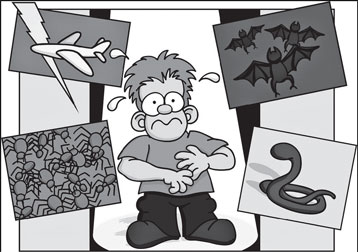Baffling phobias
 A phobia is an extreme fear of a particular thing or situation,
especially one that cannot be reasonably explained. Almost everybody has
some kind of phobia. If you have no morbid fear of darkness
(achluphobia), you will fear flying (aviophobia). Those who do not fear
thunder (ceraunophobia) may have a morbid fear of confined spaces
(claustrophobia). If you look at the list of phobias, you will easily
find your own phobia. A phobia is an extreme fear of a particular thing or situation,
especially one that cannot be reasonably explained. Almost everybody has
some kind of phobia. If you have no morbid fear of darkness
(achluphobia), you will fear flying (aviophobia). Those who do not fear
thunder (ceraunophobia) may have a morbid fear of confined spaces
(claustrophobia). If you look at the list of phobias, you will easily
find your own phobia.
As students and then as adults, we knew of a limited number of
phobias. About 50 years ago, a college student could count only about 50
phobias. We knew the meanings of most of the phobias. For instance, some
of us are scared to climb heights or look down from a high-rise building
(acrophobia). Some women have a morbid fear of men (androphobia). Most
foreigners visiting the island fear spiders (arachnophobia). Some of us
do not like to travel for fear of accidents (dystychiphobia). Then there
are confirmed bachelors and spinsters. Some of them may be suffering
from gamophobia (fear of marriage).
Although many of us treat phobias lightly, there are millions of
sufferers around the world. Scientists and psychologists are offering
new treatment and giving the sufferers much needed hope. With all our
modern-day pressures, if we have some morbid fears, what will happen to
us? Another danger is that most sufferers do not like to admit that they
have a morbid fear of something. Of course, there are sensible people
who know what they fear.
New phobias
What is remarkable is that a word has been coined to describe every
conceivable phobia the human mind can think of. Some phobias may appear
to be silly in the Digital Age. However, for the sufferer, a phobia is
something for which he has to find a remedy. For instance, most of us
have no fear of clouds. We love to watch them floating in the sky.
However, for a person suffering from nephophobia, clouds will be a
threat to his life. Children and adults enjoy the antics of clowns at
carnivals. But some people have a morbid fear of clowns (coulrophobia).
Sometimes we meet beggars who have never taken a bath. May be they are
suffering from ablutophobia (fear of bathing).
 Some of the human fears labelled under phobias appear to be
tongue-in-cheek. Although we can understand the gravity of agrizoophobia
(fear of wild animals) or demonophobia (fear of demons), will any of us
suffer from the fear of beautiful women (caligynephobia)? Similarly, it
is difficult to understand whether there are people who suffer from the
fear of walking (ambulophobia). Strangely, some people have a morbid
fear of gold (aurophobia). Some of the human fears labelled under phobias appear to be
tongue-in-cheek. Although we can understand the gravity of agrizoophobia
(fear of wild animals) or demonophobia (fear of demons), will any of us
suffer from the fear of beautiful women (caligynephobia)? Similarly, it
is difficult to understand whether there are people who suffer from the
fear of walking (ambulophobia). Strangely, some people have a morbid
fear of gold (aurophobia).
If you look at the growing list of phobias online, you can easily
find your own phobia. However, some of these phobias may not need
medical or psychological treatment. People have experimented with
home-made remedies. If you have a morbid fear of stairways, you can try
the elevator. If you have a fear of flying (aviophobia), you can take a
preflight cocktail! However, with some phobias, home-remedies do not
appear to answer.
Treatment
Today, neuroscience and psychotherapy have developed advanced methods
of treatment to cope with phobias. If you have an unbearable lifetime
phobia, psychotherapy appears to be the best remedy. Scientists have
developed new medications to grapple with the brain’s phobic sparks.
They have already developed a drug to counteract social phobias such as
allodoxaphobia (fear of opinions), androphobia (fear of men) or
atychiphobia (fear of failure). Psychologist David H. Barlow, Director
of the Center for Anxiety and Related Disorders at Boston University is
hopeful that most phobia disorders could be treated effectively.
Phobias are different from things we dislike. If you dislike
strangers, it is not a morbid fear of strangers (xenophobia). Similarly,
if you dislike dancing, you are not suffering from chrophobia (fear of
dancing). Therefore, there is no need to panic when you go through the
list of phobias. According to experts, a true phobic reaction affects
your central nervous system. The sufferer is likely to experience
sweating and heavy breathing. Such people usually avoid the objects they
are terrified to look at.
People suffering from social phobias have a morbid fear of meeting
people. Those having panic disorders entertain fears without any
apparent reason. Then there are specific phobias such as fear of snakes
(ophidiophobia), puppets (pupaphobia) or frogs (ranidaphobia). Such
phobias can be easily treated, psychologists say.
In extreme cases, a person suffering from a phobia may seek the help
of a therapist. However, psychotherapy is usually a slow process. As
such, the sufferer’s problems will not melt away quickly. As Ehrenberg
and Ehrenberg point out, “Psychotherapy takes time, effort and courage.”
|


